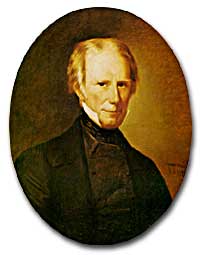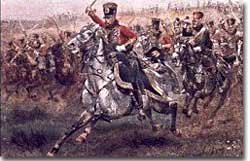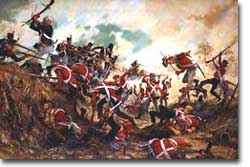21c. Diplomatic Challenges in an Age of European War

While serving as a Kentucky Representative to the Congress, Henry Clay was a leading "War Hawk," strongly in favor of going to war for a second time with Britain to ensure America's place in the West.
While western movement and policies were reshaping the republic, European wars also presented a major challenge to the new country. The Napoleonic Wars (1802-1815) were a continuation of the conflict begun in the 1790s when Great Britain led a coalition of European powers against Revolutionary France, though France was now led by the brilliant military strategist Napoleon Bonaparte. As had also been true in the 1790s, neither European superpower respected the neutrality of the United States. Instead, both tried to prevent U.S. ships from carrying goods to their enemy. Both Britain and France imposed blockades to limit American merchants, though the dominant British navy was clearly more successful.
In response to this denial of American sovereignty, President Jefferson and his secretary of state James Madison crafted an imaginative, but fundamentally flawed, policy of economic coercion. Their Embargo of 1807 prevented U.S. ships from any trade with Europe in the belief that dependence on American goods would soon force France and England to honor American neutrality. The plan backfired, however, as the Republican leaders failed to understand how deeply committed the superpowers were to carrying on their war despite its high costs.

The Napoleonic Wars in Europe had a great effect on the happenings of the 19th-century United States.
The Embargo not only failed diplomatically, but also caused enormous domestic dissent. American shippers, who were primarily concentrated in Federalist New England, generally circumvented the unpopular law. Its toll was clearly marked in the sharp decline of American imports from 108 million dollars worth of goods in 1806 to just 22 million in 1808. This unsuccessful diplomatic strategy that mostly punished Americans helped to spur a Federalist revival in the elections of 1808 and 1812. Nevertheless, Republicans from Virginia continued to hold the presidency as James Madison replaced Jefferson in 1808.
Madison faced difficult circumstances in office with increasing Indian violence in the west and war-like conditions on the Atlantic. These combined to push him away from his policy of economic coercion toward an outright declaration of war. This intensification was favored by a group of westerners and southerners in Congress called "War Hawks," who were led by Henry Clay of Kentucky.

Future President Andrew Jackson seized the day by defeating the British at the Battle of New Orleans in January, 1815. Unfortunately, neither army had learned that the War of 1812 ended on Christmas Eve, 2 weeks earlier.
Most historians now agree that the War of 1812 was "a western war with eastern labels." By this they mean that the real causes of the war stemmed from desire for control of western Indian lands and clear access to trade through New Orleans. Further, the issue of national sovereignty, so clearly denied by British rejection of American free trade on the Atlantic, provided a more honorable rationale for war. Even with the intense pressure of the War Hawks, the United States entered the war hesitantly and with especially strong opposition from Federalist New England. When Congress declared war in June 1812, its heavily divided votes (19 to 13 in the Senate and 79 to 49 in the House) suggest that the republic entered the war as a divided nation.






